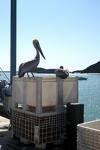The war of words between the former deputy head of the UN mission to Afghanistan and the country's president escalated last night when Peter Galbraith suggested that Hamid Karzai's "mental stability" was in question and that he has a substance abuse problem.
Galbraith, the US diplomat who worked for the UN in Kabul until last year, made his remarks live on US television. His comments come as the White House considers withdrawing an invitation for Karzai to meet Barack Obama in Washington next month.
Galbraith, the former UN deputy special representative in Afghanistan, was responding to allegations first made by Karzai last Thursday that the international community and Galbraith in particular had been responsible for "massive fraud" during last year's disastrous presidential election.
"He's prone to tirades, he can be very emotional, act impulsively," Galbraith said on MSNBC television. "In fact some of the palace insiders say that he has a certain fondness for some of Afghanistan's most profitable exports."
When asked whether he was saying Karzai had a substance abuse problem, Galbraith said there were "reports to that effect".
"This continued tirade raises questions about his mental stability and frankly this has been of concern to diplomats in Kabul."
Siamak Hirawi, a presidential spokesman, rejected Galbraith's claims and said the palace condemned the US diplomat's remarks.
"What Mr Galbraith said is far away from the principle of diplomacy and it simply confirms what President Karzai was saying about [Galbraith's] involvement in corruption."
A White House spokesman, Robert Gibbs, has said the US will consider cancelling Karzai's invitation to meet Obama in Washington on 12 May in the light of any "further remarks" the Afghan president makes.
The foreign secretary, David Miliband, has intervened in the row, saying that "malign suggestions" the UK was involved in interfering with the elections were "completely without foundation".
Karzai's claims that foreigners were responsible for "very widespread fraud" during the election were first made shortly after Barack Obama made a fleeting visit to Kabul last week.
On Sunday, during a trip to Kandahar, he told the BBC that he stood by his allegations despite the furore they had created.
There is some evidence that by sticking up for Afghan sovereignty he has gained some kudos among ordinary Afghans, but many MPs and members of the country's establishment have been horrified to see him jeopardise the critical Afghan-US relationship.
Last week Abdullah Abdullah, the opposition leader who polled second in last year's election, said Karzai's behaviour recently had been "erratic" and that "as a former colleague and doctor I think this is beyond a normal attitude".
One western diplomat said the announcement had been long expected. "The question now is who Karzai appoints to replace them and whether it is a constructive or spiteful appointment. Will he simply pick another Ludin or will he find someone who is impartial?"
There is nothing civil about civil wars!


.jpg)